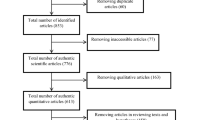Abstract
Little research has been conducted on ineffective behavior or “bad” characteristics of managers as contrasted with effective behavior or “good” characteristics. This study examines the perceived characteristics of bad managers as well as good managers. In contrast to a stereotypical view of the good manager as masculine, bad managers were seen by business students as low in both masculinity and femininity, or in nonstereotypical terms. Results were not affected by the relative social desirability of masculine and feminine characteristics.
Similar content being viewed by others
References
Bem, S. The measurement of psychological androgyny. Journal of Consulting and Clinical Psychology, 1974, 42, 155–162.
Bem, S. L. On the utility of alternative procedures for assessing psychological androgyny. Journal of Consulting and Clinical Psychology, 1977, 45, 196–205.
Bem, S., & Watson, C. Scoring packet: Bem Sex Role Inventory. Unpublished document, Standord University, 1976.
Bowman, G. W., Worthy, N. G. & Greyser, S. A. Are women executives people? Harvard Business Review, 1965, 43, 52–67, 166–178.
Broverman, I. K., Vogel, S. R., Broverman, D. M., Clarkson, F. E., & Rosenkrantz, P. S. Sex-role stereotypes: A current appraisal. Journal of Social Issues, 1972, 28, 59–78.
Employment and Training Report of the President. Washington, D.C.: U.S. Government Printing Office, 1982.
Hoffman, L. W. Changes in family roles, socialization, and sex differences. American Psychologist, 1977, 32, 644–657.
Massengill, D., & DiMarco, N. Sex role stereotypes and requisite management characteristics: A current replication. Proceedings: Annual Meeting of the Academy of Management, San Francisco, August 1978.
Osborn, R. N., & Vicars, W. M. Sex stereotypes: An artifact in leader behavior and subordinate satisfaction analysis? Academy of Management Journal, 1976, 19, 439–449.
Powell, G. N., & Butterfield, D. A. The “good manager”: Masculine or androgynous? Academy of Management Journal, 1979, 22, 395–403.
Ruble, D. N., & Ruble, T. L. Sex stereotypes. In A. G. Miller (Ed.), In the eye of the beholder: Contemporary issues in stereotyping. New York: Holt, 1980.
Schein, V. E. The relationship between sex role stereotypes and requisite management characteristics. Journal of Applied Psychology, 1973, 57, 95–100.
Schein, V. E. Relationships between sex role stereotypes and requisite management characteristics among female managers. Journal of Applied Psychology, 1975, 60, 340–344.
Stogdill, R. M. Handbook of leadership. New York: Free Press, 1974.
Author information
Authors and Affiliations
Additional information
This study was supported by a grant from the University of Connecticut Research Foundation. An earlier version of the article was presented at the 11th Annual Meeting of the American Institute for Decision Sciences, New Orleans, November 1979.
Rights and permissions
About this article
Cite this article
Powell, G.N., Butterfield, D.A. If “good managers” are masculine, what are “bad managers”?. Sex Roles 10, 477–484 (1984). https://doi.org/10.1007/BF00287256
Issue Date:
DOI: https://doi.org/10.1007/BF00287256




